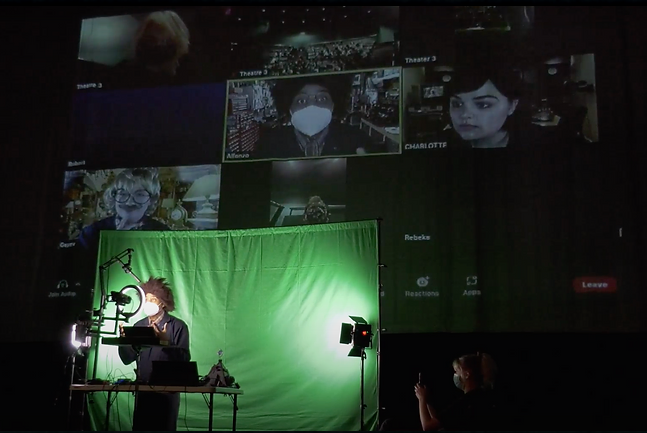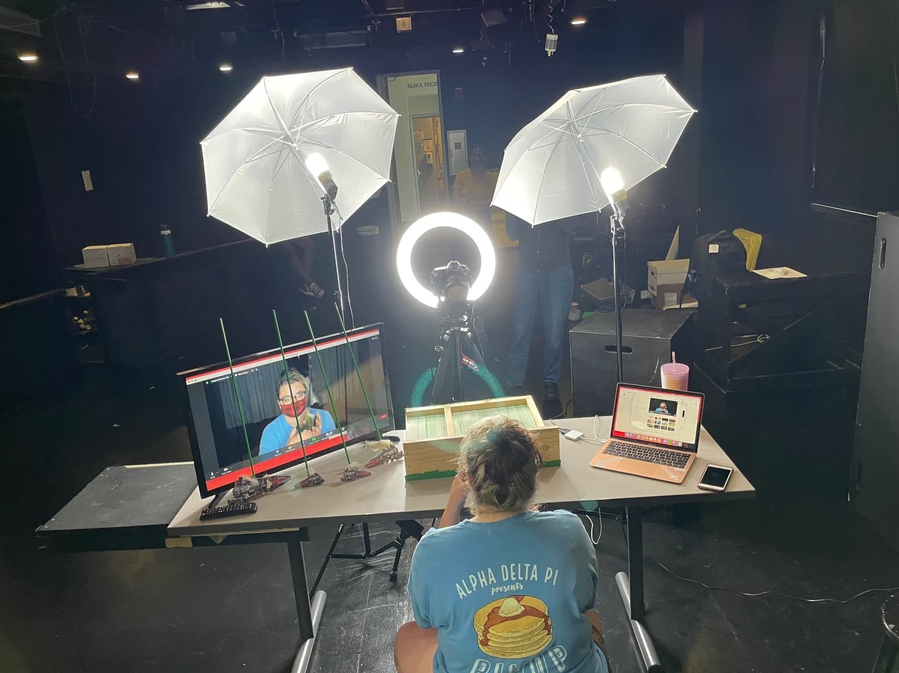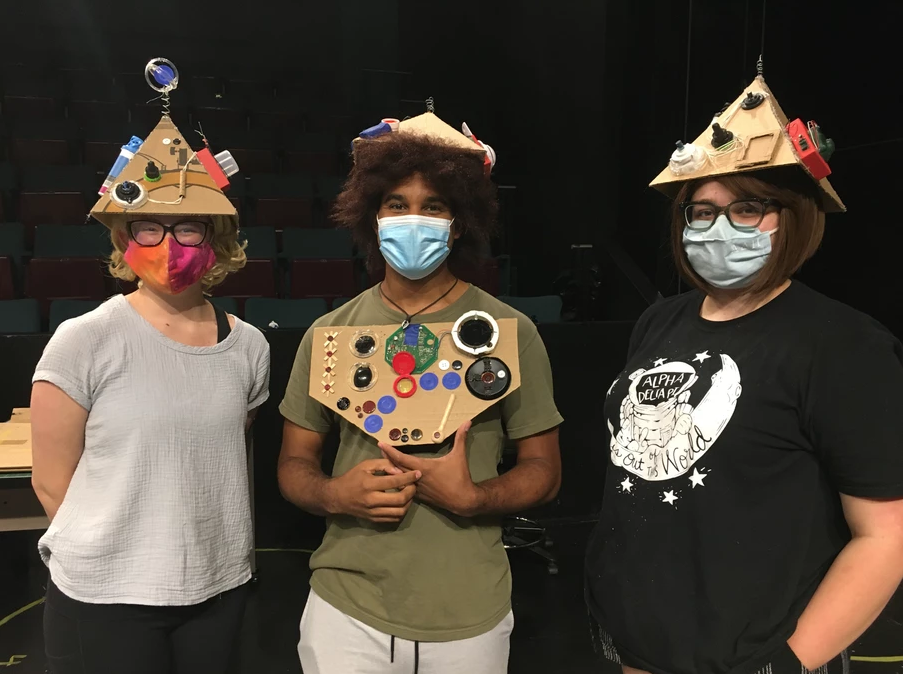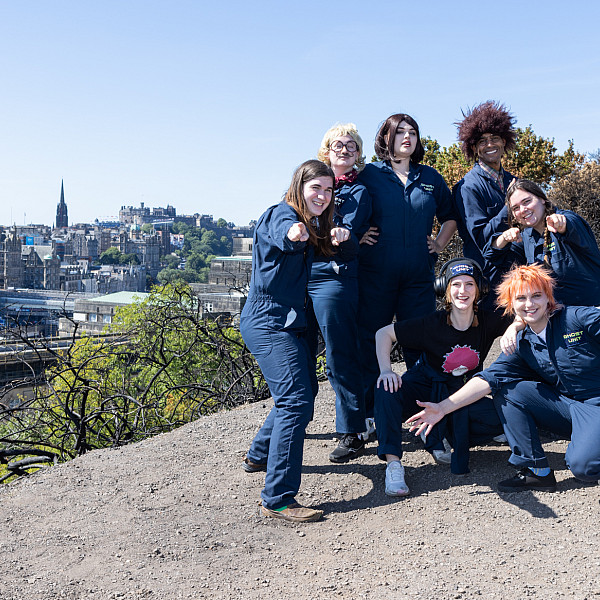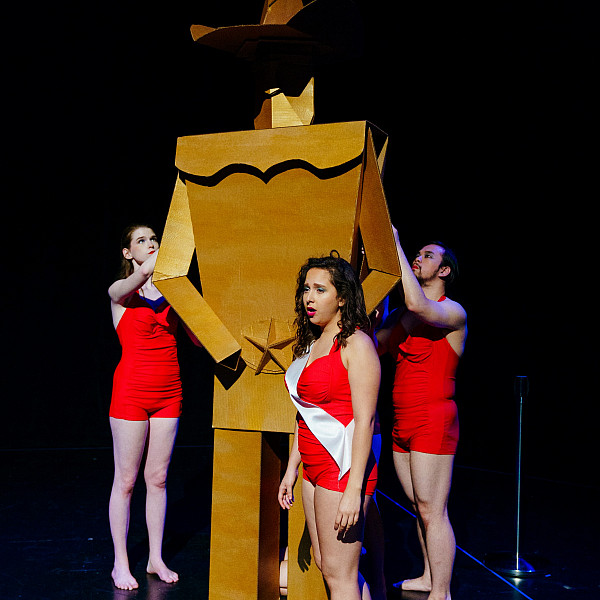News
G.H.O.S.T. Unit Takes Theater to New Dimensions at Southwestern
What happens when you start a devised theater project with three Southwestern University students and the Anton Checkov play, The Cherry Orchard? You end up with a nationally recognized production called G.H.O.S.T. Unit: The Live Event.
May 01, 2022
May 01, 2022
Open gallery
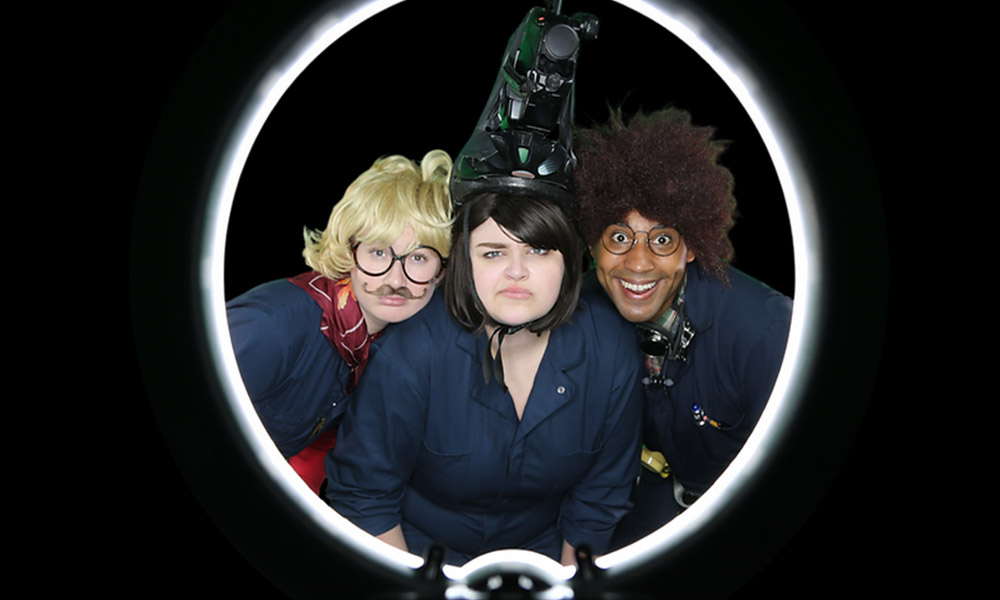
What happens when you start a devised theater project with three Southwestern University students and the Anton Checkov play, The Cherry Orchard? You end up with a nationally recognized production called G.H.O.S.T. Unit: The Live Event. The play has characters and themes loosely based on The Cherry Orchard but makes fun of reality television shows that focus on hunting for ghosts. It also addresses modern issues, takes place in four separate theater spaces, and coalesces on Zoom. It truly is a performance for our times.
Students Campbell Duffy ’22, Jamie Hotaling ’23, and Dane Parker ’22 began work on the project last spring with Associate Professor of Theater Sergio Costola and Part-Time Assistant Professor of Theater CB Goodman. The students had participated in Costola and Goodman’s Devised Theater class in the fall of 2020 and were tasked with developing a devised theater performance for the world-renowned Edinburgh Fringe Festival in August 2022.
Devised theater works by nature are collaborative. A group of collaborators begin without a script. They decide on what stories they want to tell and which characters to develop. The script is written as rehearsals proceed.
The instructors had already selected Checkhov’s dry, turn-of-the-century piece The Cherry Orchard as a starting point for the project. It seems an unlikely vehicle for a very modern performance given its slow pace and plot around an aristocratic family that loses everything and is unable to function in a changing world.
The students were not initially thrilled about creating something around Checkhov’s work, but soon came around to understand why Costola and Goodman chose it. Duffy said, “It involved a lot of themes that we were feeling through COVID, like the inability to connect with people, the inability to be with the people we love. We are sort of missing out on a lot of our life, just as the characters were in The Cherry Orchard.”
Because the pandemic loomed large, part of the student research involved watching many remote theater performances to find out what they did and didn’t like about the performances. By the summer of 2021, the three were working together from 9–5 each day, creating the show that became G.H.O.S.T. Unit.
“We had the concepts about a dystopia where the world is changing that included new world ideas, miscommunication, missed connections, and being haunted by things,” said Duffy. “We had thought about what sort of container this show would be.
But they still weren’t certain how to convey all of the themes.
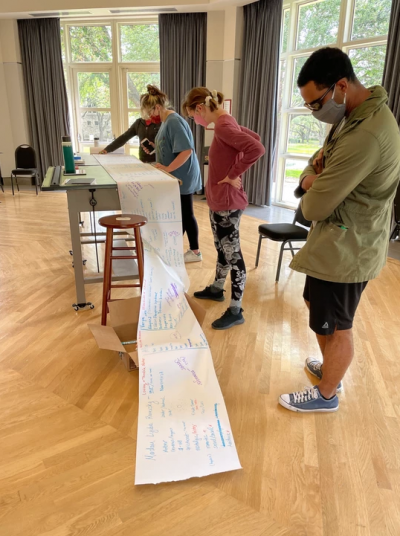
From there G.H.O.S.T. Unit emerged. The three decided which characters from The Cherry Orchard they wanted to develop, drawing on what they had learned from Goodman regarding clown techniques. The result: Zany characters Charlotte, Alfonzo, and Gayev who search for the paranormal in an orchard.
The actors perform before a live audience in separate theaters. Each is in front of a green screen and controls their own camera and rely on their invisible assistant to help them with puppets and props. Their invisible assistants are students Oskar Brian ’22, Harrison Ray Jones ’23, and Jessica Workman ’22.
While developing the production, the students realized Checkhov’s commentary on the plight of invisible workers and others invisible in society applied to the invisible helpers needed in every theater production.
“Invisible work is a huge theme in The Cherry Orchard,” Hotaling said. “They are always talking about these workers who built the cherry orchard, about slavery and serfdom. We took the notion and Americanized it. We’re seeing all of this invisible work happening with the Amazon warehouses, and the people don’t necessarily get recognized for the work they do to essentially support society.”
Mixing comedy with social commentary, the students took their creativity—and multitasking skills—to new heights in an effort to engage their audiences
Professor Costola said that he knows of no one other production like theirs, fusing scenes from separate theaters and Zoom. The students have to stay in character, act, and make sure the technology is working properly. They each have a table with a mechanical arm that holds the camera, two monitors, a mini-mixer to control the sound, and a stream deck to help them customize their streaming process.
“The actors are calling their own cues, while they are simultaneously live and on camera,” he explained. “It took a lot of training because they always have to look in the camera and do everything by memory, pressing buttons and interacting with each other.”
From the viewers’ perspective, the experience is different depending on the vantage point. Live audience members in the theaters often react to behind-the-scenes actions by the invisible assistants, puppets, or the actor; while the Zoom audience members are unable to see the source of the laughter.
Although the Zoom viewers had limitations, they had one advantage: the chat button. And they loved it. To enhance the Zoom audience’s experience, a new character named Danny was added to the cast. Played by Lilly Percifield ’22, Danny is the “ground zero” manager of the ghost hunting crew who interacts with the audience via chat.
“Danny adds a fun new character to help the audience feel comfortable and have someone to interact with. She builds hype on Zoom and also builds a world for our characters making us much more famous than we really are,” explained Duffy.
In February, G.H.O.S.T. Unit was one of six shows presented at the Region 6 Kennedy Center American College Theater Festival. The region covers the states of Arkansas, Louisiana, Oklahoma, Texas and New Mexico. Prior to that, the cast had to perform for Kennedy Center jurors, and the troupe was nominated for several recognitions: Best Devising Practice, Best New Work, and two Best Actor Awards for Duffy and Hotaling.
Despite their success, the G.H.O.S.T. Unit crew sees the script as a living document and are continuing to refine it in preparation for the Edinburgh Fringe Festival. Currently, it is about 30 minutes long and they plan to add another 20-30 minutes to it for the festival.
Devising G.H.O.S.T. Unit has been life-changing for Duffy, Hotaling, and Parker. All three are grateful for the experience that has given them the confidence to move forward as artists.
Hotaling’s emphasis had been on stage management and lighting design prior to the experience, but now has acting experience to draw on. Duffy acknowledged she has become a stronger actor and learned to better read the audience while performing. “I know that I can create original theater and have the capacity for it,” she said.
Parker said that it has changed how he views his career. “It has changed me. Now I’m an artist, an actor, a creator… It’s changed how much I think I can do with this craft. It changed from being a job to being a life for me.”















